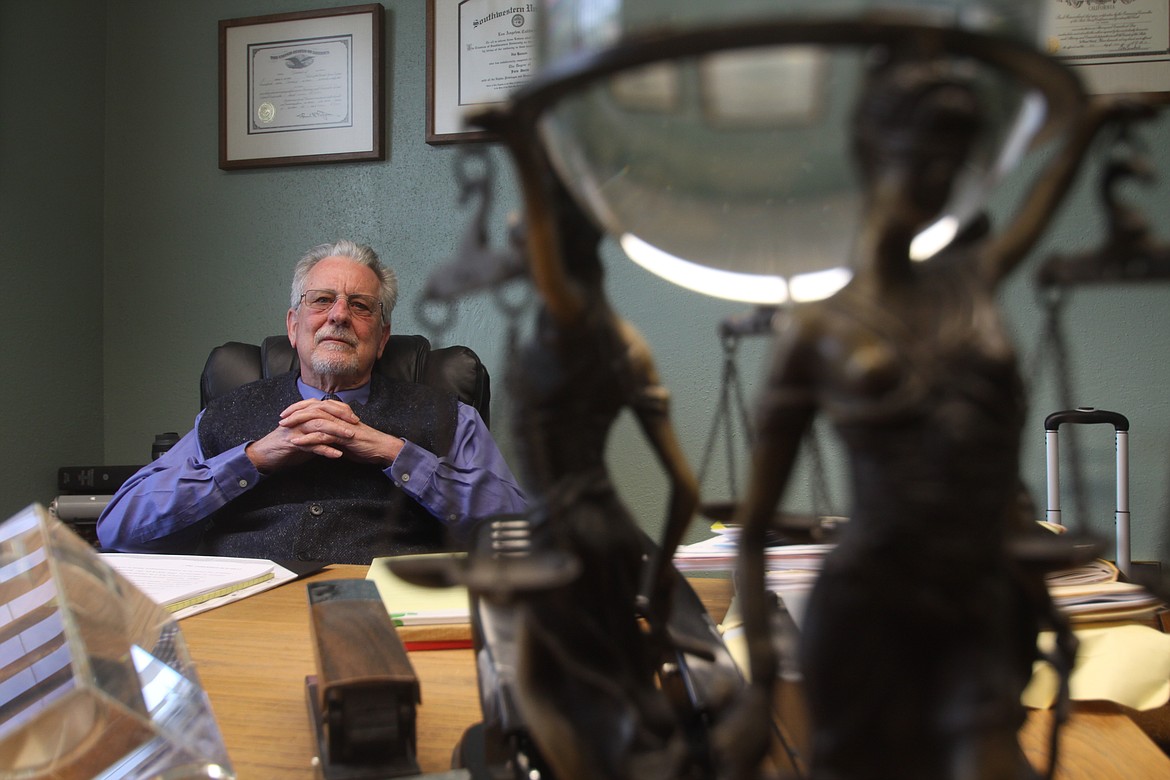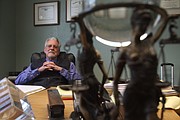A FATHER'S FIGHT PART 3 'So it doesn't happen to other kids'
The Idaho Department of Health and Welfare recently paid a $350,000 settlement to Doug Bressie and his kids, but the agency will not admit fault in the case.
Bressie was reunited with his children in 2013, after an ordeal that began in 2008, when the state took his kids — Dusty, Oscar and Derringer — and according to court records, placed them with foster parents unable to care for them, terminated Bressie’s parental rights and threatened to place his children for adoption.
In an email, an Idaho Health and Welfare spokesman said the agency stands by its handling of the Bressie case, and that the department and its employees would not address specific allegations.
“While we cannot provide details of the specific 2008 child welfare investigation you asked about due to confidentiality requirements, it’s important to note that the settlement agreement signed by the plaintiffs stipulates that the settlement is a compromise of a doubtful and disputed claim, and that the payment made is voluntary and is not to be construed as an admission of liability on the part of the Department,” the agency’s public relations officer Chris Smith said. “In fact, the Department specifically denies liability and agreed to settlement merely to avoid further protracted litigation.”
The allegations against the agency, which were pointedly discussed in expert witness testimony in Bressie’s civil suit against child protective services, included a lack of records showing the agency took steps to preserve the Bressie family. Keeping the family together is a key component of the state’s Standard of Family Preservation, said April Linscott, a Hayden attorney hired by Bressie to file the suit against the state.
The agency also failed to meet timeframes outlined by the state to deliver services, which include custody, reunification and court dates to establish placement.
None of the standards were met, said Linscott.
Finding an expert to testify against the agency in Idaho was difficult, said Linscott, who hired Monique Busch, a clinical therapist and consultant from Portland, Ore., to testify on Bressie’s behalf.
Busch said the state’s failure to meet its own standards “amounted to a deliberate indifference to the harm that was caused to these children … further, the state acted arbitrarily and capriciously when it recklessly disregarded the family’s fundamental liberty interest in maintaining a familial relationship.”
Child protective services had broken the law, over and over again, Busch said.
The agency failed to place the siblings together, a provision of its standards, and it violated another standard that required ensuring the children’s well-being.
Six times in 2008, as Dusty suffered from a lack of care, and was twice hospitalized for her diabetes, the state failed to address unmet physical needs, Busch wrote.
Nine similar incidents were documented in 2009.
“On or about Nov. 3, 2009, (Dusty had a new foster placement as of 10/31/09) concern was expressed about Dusty’s care, potential coma. The state failed to address Dusty’s physical needs,” according to Busch’s report.
The agency also failed Oscar, who expressed a desire to harm himself, and following a suicide attempt in January 2009, continued to show a desire to harm himself.
“Incident reports increase to almost daily,” Busch wrote. “The state failed to address Oscar’s mental or physical health needs.”
The report pinpoints sexual abuse or neglect by a foster family. Barb Kingen was accused of locking the children in a garage, putting soap in their mouths, or not giving them food as punishment. The issues were not resolved, according to Busch, despite depositions by two case workers who questioned Kingen’s ability to care for foster children.
“There is no indication the state took any action … after these complaints,” Busch wrote in a detailed, 17-page report.
“The State of Idaho, Department of Health and Welfare did not follow their own standards of care, as well as adopted federal standards, in providing services to the Bressie family,” Busch wrote. “(This) caused significant harm by separating the siblings, as well as separating all three children from their father for an inappropriate length of time in violation of the Adoption and Safe Families Act.”
Busch said Health and Welfare’s actions were marked by “deliberate indifference to a known right, and intentionally and knowingly caused harm to the children.”
In the parking lot of his attorney’s office in Hayden, under a bluebird spring sky, Bressie recently said his children, after returning home from the almost-five-year-long separation, required years of parental patience to adjust to being back in the Bressie family.
“Derringer was so little when they took him, he hardly knew who I was,” he said.
Bressie shed 40 pounds, he said, from the anxiety.
“I swear to God, I almost went crazy, but I figured that was what they wanted,” he said.
In their years away, the Bressie children were prescribed a regimen of antipsychotic and behavioral medications by the state that, by working with a physician, the children are no longer required to take.
“They were angry,” Bressie said. “They weren’t easy to deal with.”
The children that returned home had dark rings under their eyes. They were combative, suspicious and fearful. They were also uncharacteristically gaunt.
“I could stick my fist up under my ribs,” Oscar recalls.
Dusty, being fed a diet of unhealthy foods by foster parents who were not trained to care for diabetics — in contrast to the closely-monitored meals of chicken and fish her dad had fed her before foster care — had ballooned.
“They were so confused, when they came back,” Bressie’s sister, Denise Johnson, of Hayden, said. “They were afraid someone was going to come and take them again.”
Their experiences with the state left marks on the family, Johnson said.
“My brother’s not the same person,” she said. “He has lost a lot. But he never gave up. I think they expected him to give up. Most people would have.”
She attended so many court dates in support of her brother and the children throughout the 10-year-ordeal, she said, that she lost track of the years as they ticked by without a resolution.
“I cried through most of them,” she said.
She watched her little brother do whatever he could to make money to pay court costs and attorney fees.
“But it wasn’t really about the money,” she said. “It’s about other kids … having this done to them.”
It’s about uncovering what Denise Johnson calls lies by the agency and its caseworkers that were masqueraded as legitimate concerns.
“They were just never going to admit they were going down the wrong road,” said James Hannon, a Coeur d’Alene attorney who, with Linscott, represented Bressie in the final stages of his case. “The truth had no place in this.”
Linscott’s assessment is more blunt.
“Their main argument was, we’re the state, so we win,” she said.
Blowing cigarette smoke into spring gusts that hurl from the Rathdrum Prairie like passing freight cars, his graying cowboy mustache strapped to a tight chin, Bressie stands in the parking lot of his attorneys, with just one wish, he said.
“I want people to know what happened, so it doesn’t happen to any other kids.”



